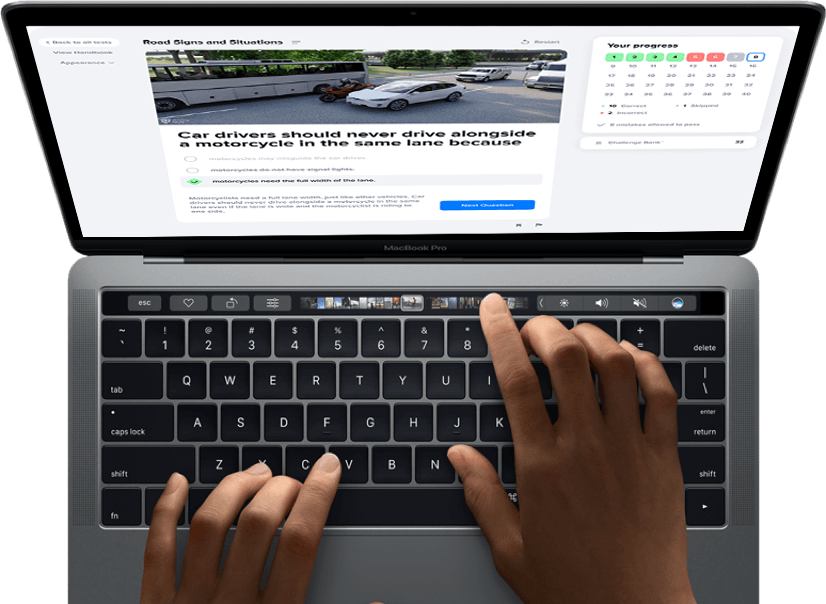Earning your CDL is an important process if you plan to hit the streets in a commercial motorized vehicle (CMV). It all starts with knowing about the rules and requirements set by the Federal Motor Carrier Safety Administration (FMCSA). Each state has their own application process, fees, and forms, but they all adhere to the federal requirements of the FMCSA. Learn about the different requirements so you can be well on your way towards a career in truck driving.
Get professional CDL training from the comfort of your home -- from a trusted FMCSA-approved ELDT provider. Pass Guarantee.
Minimum Requirements for a Commercial Learner’s Permit (CLP) or Commercial Driver’s License (CDL)
- Possess a valid non-commercial driver’s license.
- Have one or two years of driving experience (depends on the state).
- If you wish to obtain a Class A or Class B CDL, you must successfully complete driver training from FMCSA-approved training providers.
- Be at least 18 years old to drive intrastate (within the state).
- Be at least 21 years old to drive interstate (out-of-state) or to transport hazardous materials.
- Provide proof of citizenship or lawful permanent residency (Section 383.71).
- Social security card, or proof of the number.
- Birth certificate.
- Valid passport.
- Green card.
- Must be able to speak and read English at a sufficient level (Section 391.11).
- Provide a DOT medical card, which requires a DOT physical.
- Must not be a disqualified driver (Section 383.51)
- Some states may require the completion of a CDL training course.
- Pass all required background checks.
Federal CDL Application Requirements
To be able to apply for a CDL, you must first obtain a CLP. The CLP must be held for a minimum of 14 days (minimum days differ from state to state). A road skills test must be passed beforehand, as well as any additional knowledge or skills exams for endorsements.
Additional compliance requirements issued by the FMCSA include:
- Commercial vehicle drivers must not hold more than one CDL at a time, according to the Commercial Motor Vehicle Safety Act of 1986. This is to ensure that drivers can’t hide bad records and applying in different states.
- Texting while operating a vehicle is prohibited, effective late 2013.
- Commercial drives have to self-certify their medical information and must use authorized medical examiners from the National Medical Registry, effective 2014.
Physical and Medical Requirements
To be able to drive a commercial motor vehicle, a truck driver must have the physical capabilities of doing so, alongside the various non-driving job duties. Being a trucker means unloading and loading freight as well as driving long hours. This can cause sleep deprivation, high stress levels, relationship challenges, and physical wear and tear. With that being said, making sure you are physically and medically sound for the position is important.
Physical and medical requirements will be examined by an approved Medical Examiner, listed on the FMCSA National Registry. The Department of Transportation (DOT) medical exam will look over the following:
Vision
The visual acuity measurement should be at least 20/40 in each eye, with or without correction (includes eyeglasses or contacts). Also, there must be at least 70 degrees peripheral in the horizontal meridian measured in each eye.
Hearing
Truckers should be able to hear a forced whisper from more than 5 feet away, in at least one ear. Hearing aids are permitted to help hearing.
Diabetes
Truck drivers that require a needle injected insulin do not meet requirements. Although, diabetic drivers that take oral medications are permitted.
Blood Pressure
A driver with blood pressure below 140/90, will be certified with a 2 year card. Stage 1 high blood pressure of 140-159/90-99 will be certified a 1 year card. Stage 2 high blood pressure of 160-179/100-109 will be issued a temporary 3 month certificate (at examiners discretion). Stage 3 high blood pressure >180/110 will result in a disqualification.
Blood Sugar
Blood sugar levels are required to be less than 10%. Certificates will be issued at the discretion of the examiner for levels above 10%.
Sleep Apnea
Sleep apnea may result in a disqualification unless it is demonstrated that the condition is under control. This includes a recent annual sleep study and release from a physician.
These are some of the basic physical qualifications for commercial drivers. Other factors may be examined such as recent major surgeries, loss of limbs, etc.
Self Certification
Depending on the type of commerce you intend to drive, you aren’t required to submit a Medical Examination Certificate, unless required by an employer. Most CDL holders are non-excepted drivers and require a Medical Examination Card. To determine if you are excepted, you must self-certify:
- Interstate Non-Excepted: You must meet the Federal DOT medical card requirements.
- Interstate Excepted: You do not have to meet the Federal DOT medical card requirements.
- Intrastate Non-Excepted: You must meed the medical requirements determined by your state.
- Intrastate Excepted: You do not have to meet the medical requirements determined by your state.
Interstate: Operating inside or outside the state you obtain a CDL in.
Intrastate: Operating within the borders of the state you obtain a CDL in.
Written and Knowledge Exams
There are a few different written exams to pass when working towards a CLP or CDL. The first is the general knowledge test, followed by an air brakes test, and one or more CDL endorsement tests. To help you prepare for these tests, we have put together a number of free practice exams:
Road Skills Test
A road skills exam is required to demonstrate knowledge and skills in regards to pre-trip inspections, basic vehicle control, and on-road driving. Knowing the vehicle is safe to drive, full control of the vehicle, and safe driving habits will be assessed. The road skills test can be taken after a CLP is earned.
The road skills test must be taken in the type of commercial vehicle to be licensed in. This means bringing a Class A, Class B, or Class C commercial vehicle.
CDL Requirements by State
In addition to the requirements outlined by your employer when trying to find top CDL drivers, you should also be aware of your state requirements. For specific CDL requirements for your state, refer to your state’s official 2025 CDL manual:





